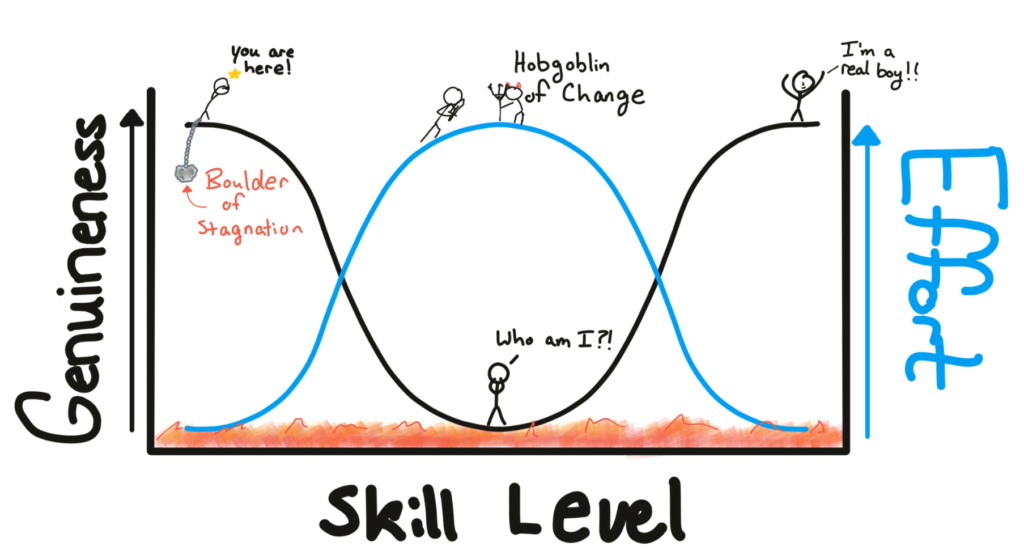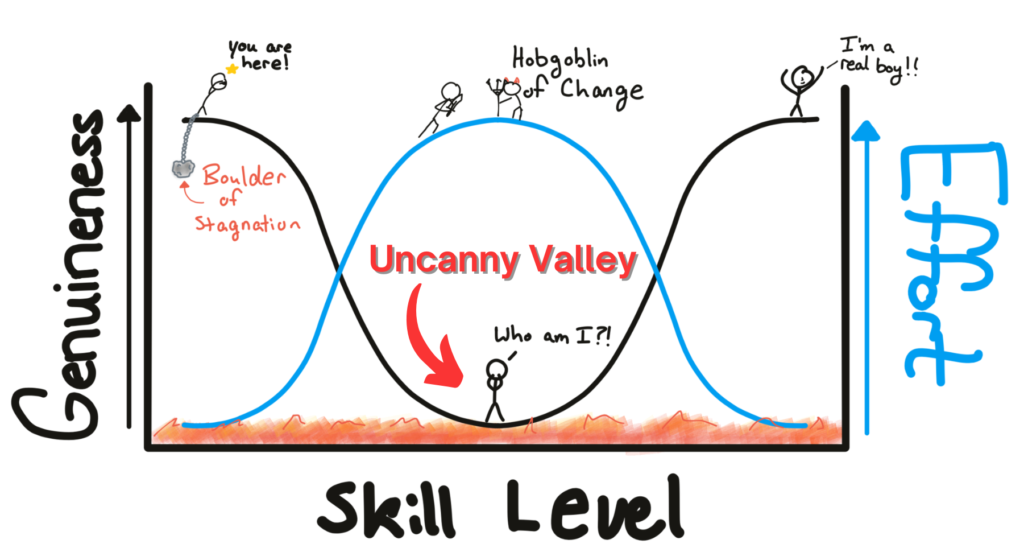🪄Keystones:
- The discomfort of trying something new is unfamiliar. Do not let that feeling of unfamiliarity stop you from traveling through the uncanny valley of change. Growth of your social skills has the most painful valley.
- Watch the language you use to describe yourself. Be especially concerned with “I am” statements. Do these identity anchors help or harm your growth and willingness to try and fail?
- Learn to fail by changing the language you use around growth and failure. I like to use the words experiments and trials.
Through this article I want you to become aware of what happens to your self-perceived genuineness or authenticity as you develop social skills so that you can endure the uncanny valley of behavior change. Then, I’ll suggest some things that can limit your growth and that of those you influence.
“Well I Just Suck”
Do you ever find yourself saying “Well, I just suck at dancing” or “I am a miserable conversationalist” or “I am just not good at remembering names”? I’m sure at some point we all tried to get better. Took a dancing class. Watched Dancing With the Stars. But after the agony of no perceivable progress being made, we stop and readjust our self-talk. “I guess I just suck at dancing. I wasn’t made to do this. I’ll start buying pairs of left shoes.” We adjust the language we use about our identity to excuse our perceived inability to get better. This turns you into the proverbial old dog that refuses to learn new tricks because you’ve redrawn your identity to avoid failing.
It wasn’t until I read Carol Dweck’s book “Growth Mindset” that I realized I had been self-handicapping with my words. There is no good reason to think ‘I suck at dancing and will forever suck at dancing.’ Have I tried? How did I try effectively? Did I try for long enough? Changing the language I use around trying and failing could reset me onto the golden path of growth.
Often, the most accurate and helpful phrasing is “I suck at this currently. But if I cared enough I could change that.” If I had the courage to endure the uncanny valley, I could change that.
Social Skills are the Hardest to Build
Some skills are completely unattached from your ego and pride. These are skills where you have no expectations that you should or ought to be good likely because it wouldn’t be a valuable thing to you even if you were world class. The more useful the skill is in your mind the more you want to be excellent at it. Things I don’t care to be good: underwater basket weaving, archery, football, cooking.
Social skills on the other hand are valuable to everyone. We are social creatures and crave to be liked. Becoming better at talking with people or honing your charisma is a painful process. It is much easier to make excuses like “I’m an introvert so a bit of social awkwardness is a part of the pedigree” than it is to change your behaviors.
Let’s take developing the skill of giving better compliments or learning to ask open-ended questions. As you make more attempts, you’ll become more aware of your current skill level and how far you must go. That self-awareness with the increased conscious effort you are putting in is uncomfortable. It was much nicer when you were unaware. Thus, the ego asks you to take a few steps back and stop trying so hard. Only do what you are good at, it might plead.
Or it might accuse you of being unauthentic to your true self. Whatever that means. It will use the leash of ingenuousness to corral you back to a place of psychological safety.
Trying on new behaviors is uncomfortable because it is unfamiliar but that does not make it disingenuous. The discomfort is from your newfound self-awareness.
I see our perceived genuineness, or authenticity, as you will, like this:

As we embark on a journey of growth, we have to put in more effort. To apply that effort effectively we must become more aware of our shortcomings so that we can begin patching them. It is at the peak of your efforts that you will start to question whether the new habits you are building are worthwhile or if you should regress to your previous state. This is where you meet the hobgoblin of change. Th hobgoblin is your ego begging you to put the blindfold back on and accept you are the way you are and that’s okay.
I call this area the uncanny valley.
The Uncanny Valley

Now, the entire point of this article is for you to become aware of the uncanny valley so you know it’s coming and so that you can 1) build your social skills and 2) embrace the trying and failing process of learning.
When I took an FBI course on hostage negotiation, they spent an incredible amount of time on active listening skills. Some of the techniques were so painful to try on. Learning to use the other person’s name more often, mirroring the last words in some of their sentences, and guessing what emotion they were experiencing with emotion labeling was unnatural. It felt robotic. Mechanical. At least I wasn’t given an optimized blink rate or ideas about how long to hold eye contact for 😂
Learning to pay more attention to myself in conversation and be graded on it was awkward. I had never tried to think so hard in the middle of a conversation before. I felt fake until I didn’t.
Once the techniques became more second nature, I found the depth of conversation I could reach with others and the degree to which I could make them feel understood had increased dramatically. I would have never built that skill set had I not continued practicing despite my discomfort.
Limiters In Our Language
If you struggle with experimenting with new behaviors and building skillsets, you may find yourself blocked by the language you use around trying. To revisit Carol Dweck’s work, write down the words and phrases you use when talking about failure. If the language you use locks you into the person you are today without giving the future version of you a chance, rewrite your vocabulary.
Instead of absolutes such as “I can’t”, “I won’t”, or “I shouldn’t” try on “I can’t yet. I am going to run an experiment. I want to give this an attempt.“
Think about running an experiment. This frame gives you the option to fail. You know not experiments go well. Not every hypothesis is correct. Your ego is safe under this guise and failure is perhaps even an expectation, but if the experiment goes poorly, you run the next one and keep iterating. Come up with the next hypothesis and keep learning.
Fail faster. Fail Forward. Run the next experiment.
Experiments
- Tomorrow night, write down all of the areas in your life with identity labels. Make note of where you think you just suck at that thing. Where did that belief first develop? Is it worth updating?
For the areas where you want to grow but have a fixed identity, what would someone who’s already a master tell you to do next? What would be the next 3 steps towards mastery you could experiment with?
- Throughout the week, attempt to observe the identity labels that your friends and family use. If nothing is obvious from what they say, try to take some guesses on what labels they would use for themselves. For the end of the week: are there any identity labels worth bringing to their attention?
